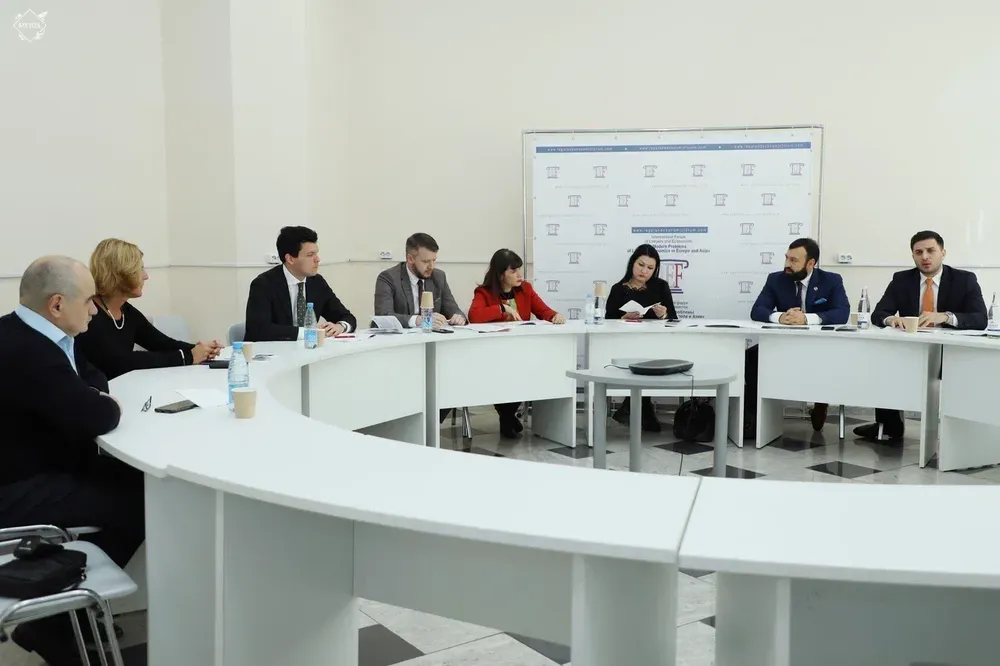
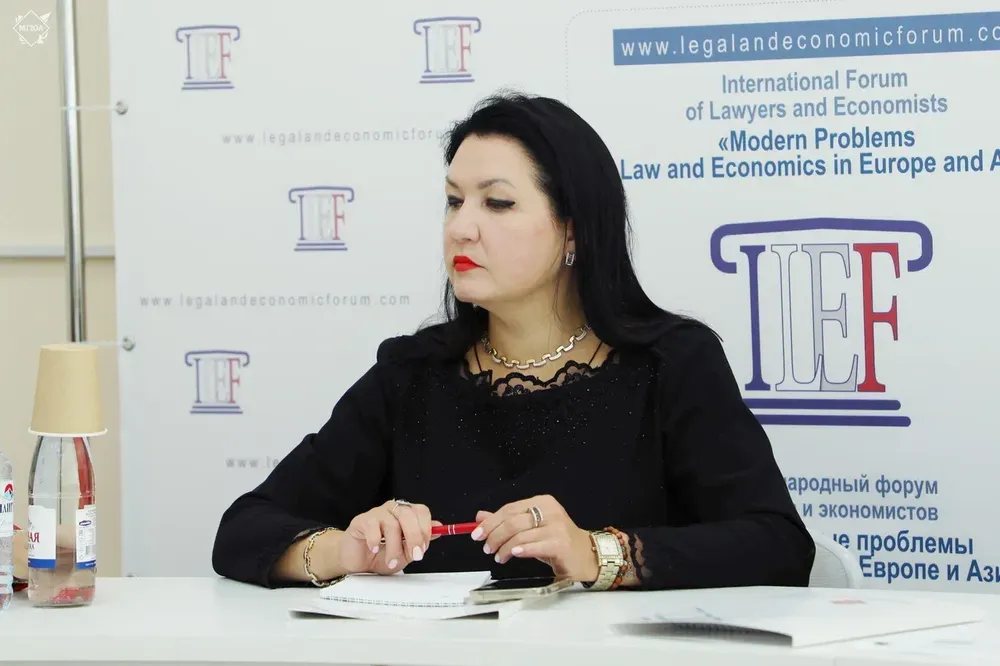
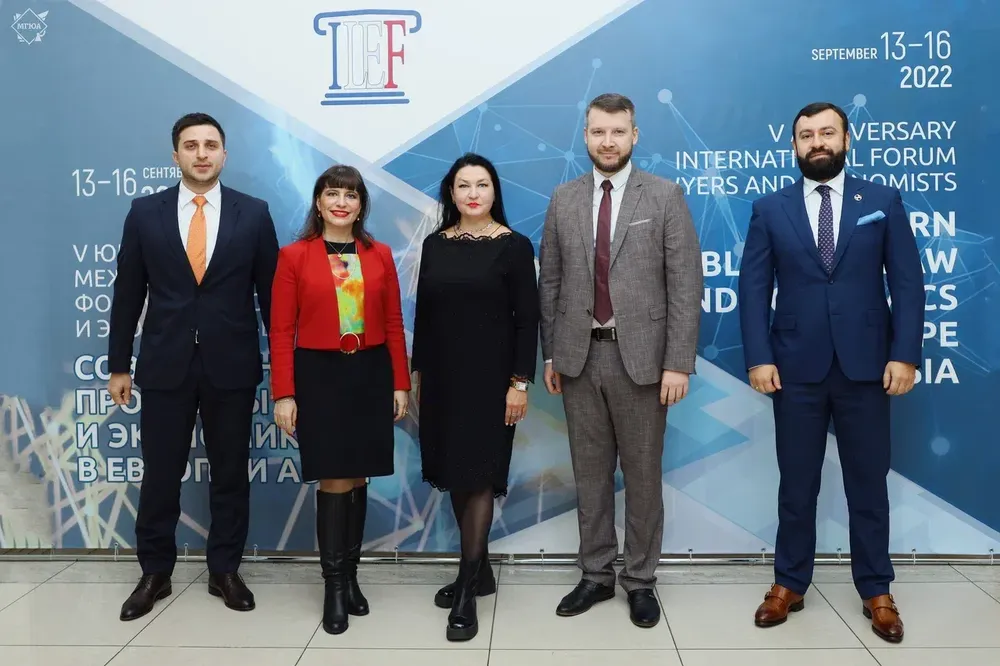
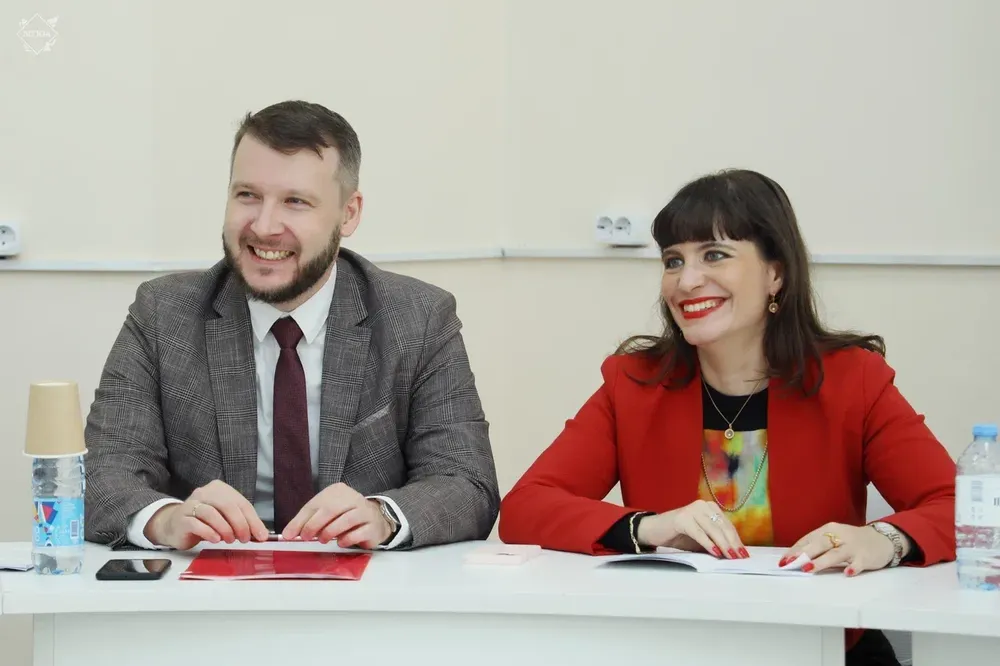
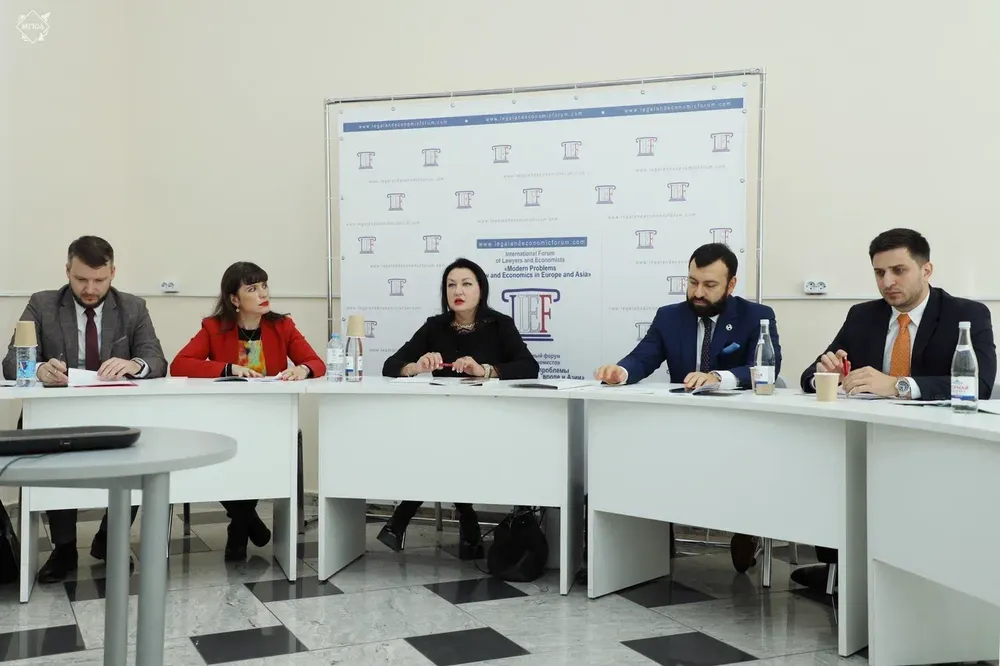
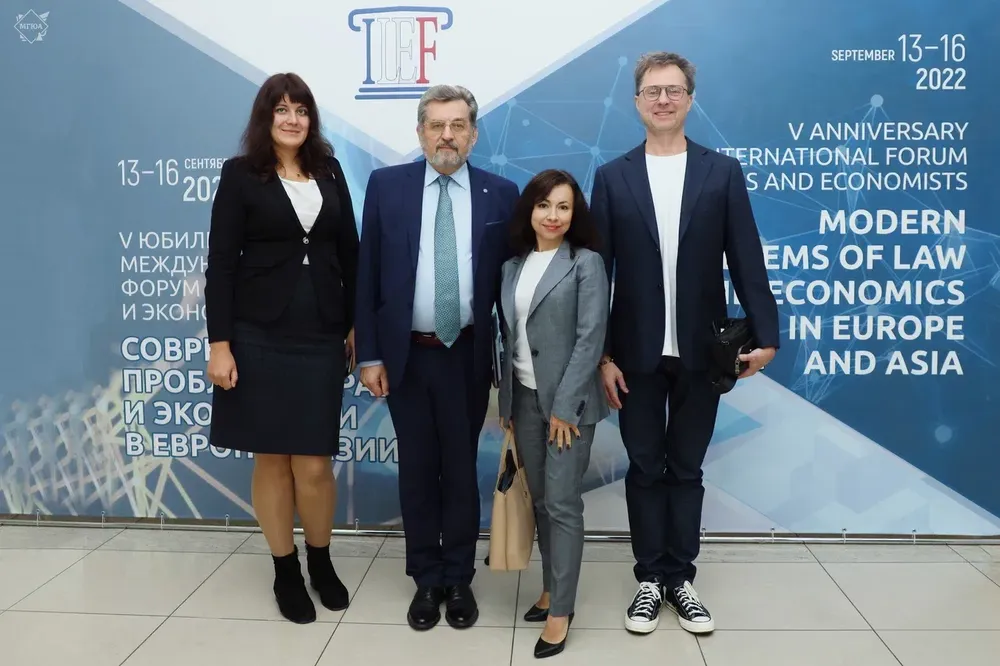
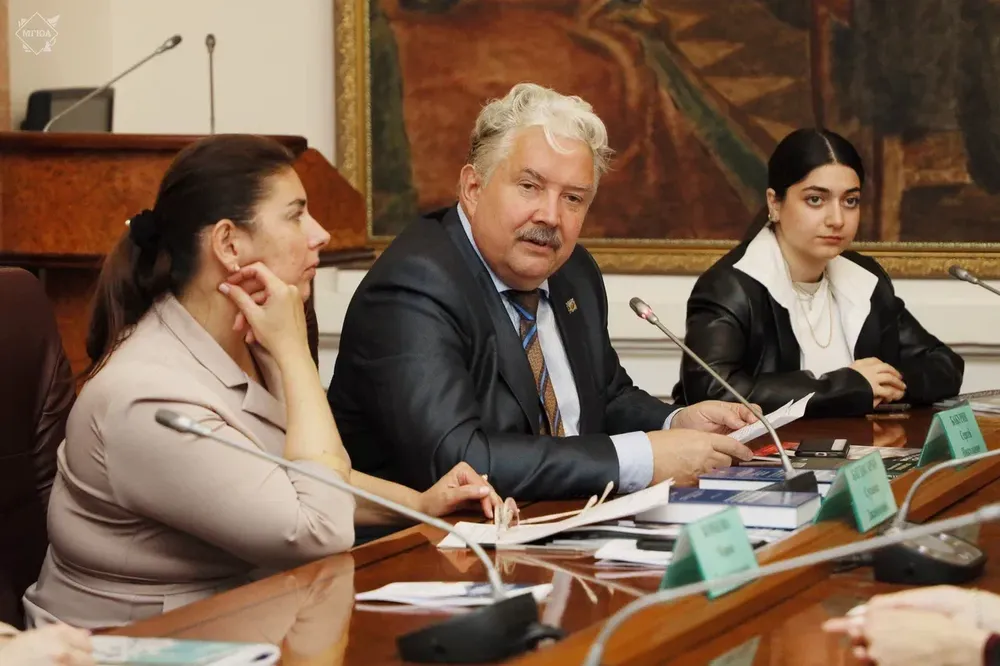
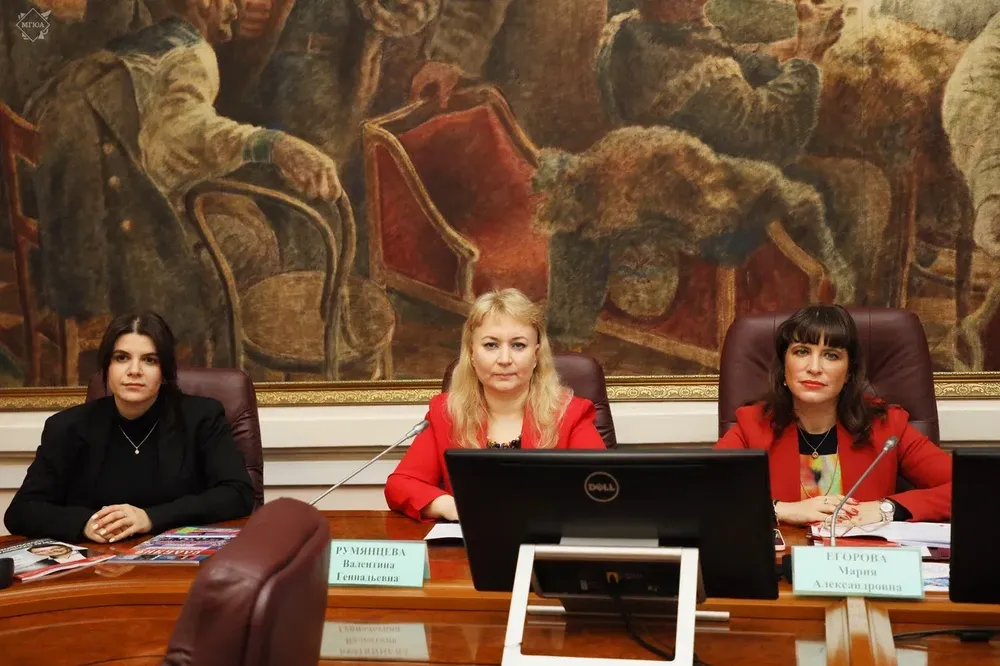
September 13, 2022
Place: Hall 1
Moderators: Viktor Blazheyev, Maria Egorova
Languages: Russian, English
The new economic reality forms the prerequisites for revising the priorities of international legal cooperation. Global changes are taking place in the normative regulation of financial relations as well as in the digitalization of the institution of law in general. Globalization affects the law, but can globalization change the law? Aspects of international legal cooperation are shifting in the face of global changes to the problems of protecting the rights of citizens, the social state, and the sustainable development of society.
Questions for discussion:
- Impact of globalization on modern law: trends in legal globalization.
- Globalization of human rights.
- Problems of trust in law and digitalization.
- Integration processes in a changing world.
- Forms of legal integration under conditions of global digitalization
- The Impact of Global Change on International Legal Cooperation
Organizers: Moscow State Law University, International Alliance of Lawyers and Economists (France)
Place: Academic Council Hall
Moderator: Maria Egorova
Languages: Russian, English
Humanitarian cooperation between Russia and Asian, CIS and EU countries is an effective instrument of “soft power”. Contextually, humanitarian cooperation covers a wide range of problems of social development and national stability. The law acts as a linking and mediating element between society and the state and the political system. The stereotypes of humanitarian cooperation are being reconsidered, many countries, including the EU, CIS and Asia, are improving legislation based on the global tasks of the new world order.
The panel will discuss the following issues:
- Adapting law to technological and economic globalization.
- Technological society and law in the context of global economic crisis
- Economic and legal problems of new alliances in Eurasia
- The Kyoto Protocol and international legal aspects of climate change prevention: experience of the CIS and Asian countries.
- Eurasian integration and sustainable development through the prism of legal unification
Organizers: Moscow State Law University, International Alliance of Lawyers and Economists (France)
Place: Academic Council Hall
Moderators: Vladimir Sinyukov, Maria Egorova
Languages: Russian, English
Digitalization is both a new challenge and new prospects for the development of law. Comparative legal research in recent years has focused on the field of legislative support for the use of digital technology in environmental, medical, civil, criminal law, court proceedings. Comparative law is objectively interconnected in the context of interdisciplinarity, in this regard, theoretical and methodological problems of national law are considered through the prism of dynamic transformations of legislation taking into account the best foreign and domestic experience.
Topics for discussion:
- Transformation of law as an evolution of its forms and origins
- Dichotomy and formalism in law.
- Problems of law enforcement heterogeneity
- Ethical norms as law regulator
- Features of law regulative mechanisms in modern conditions of legal science development.
Organizers: Moscow State Law University, International Alliance of Lawyers and Economists (France), Moscow branch of the Association of Lawyers of Russia (Scientific and Educational Center for Comparative Law)
Place: Hall 3
Language: Russian
Moderator: G. Ivliev
Organizers: Eurasian Patent Office, Moscow State Law University
The project is implemented as part of the "Priority 2030" strategic academic leadership program
Place: Hall 3
Moderator: E. Vavilin
Language: Russian
The modern period of development of private law is due to the introduction of new digital technologies in civil circulation. It is necessary to form an idea of digital opportunities in the global economic and social processes, the convergence of new technological possibilities and private law, to create a theoretical basis for the further revision of the content and transformation of private law at the stage of formation of new legal content.
Topics for discussion:
- Problems of private law doctrine, methodology and legal practice in the era of digitalization.
- Conceptual approaches to the development of civil and procedural legislation in the development of new digital technologies.
- Civil-legal regulation of digital rights and electronic transactions. Transformation of private legal and procedural relations with the use of artificial intelligence. 5.
- Digitalization of procurement of goods, works and services for state and municipal needs
- Inheritance of digital rights.
- Digital technologies in the field of intellectual property.
- Exercise of family rights in the context of digital transformation.
Organizer: Moscow State Law University
Place: Hall 4
Moderator: V. Machekhin
Language: English
A global transformation of the legal regulation of international taxation is under way, affecting both national legislation and international tax agreements. The most serious changes concern the sphere of digital economy, for which special rules are being rapidly created in different countries and there is an international dialogue on the development of unified country approaches.
The following issues are proposed for discussion:
- Legal forms of introduction of tax rules for the digital economy
- Correlation of national and international rules for taxation of the digital economy
- Analysis of existing practices of taxation of cross-border digital transactions
- The role of international organizations in global digital economy tax reform.
Speakers: Russian and foreign representatives of science, education, business and government agencies involved in the problems of taxation of transboundary digital transactions.
Organizer: Moscow State Law University
The project is implemented as part of the "Priority 2030" strategic academic leadership program
Place: Hall 4
Moderators: V. Kanashevsky, L. Terentyeva
Language: English
Large-scale introduction and use of information and communication technologies in public and state activities, as well as increased threats to cybersecurity of the state necessitate the development of adequate legal regulation of social relations in cyberspace. This request is particularly relevant in the context of sanctions pressure from Western countries due to the military operation of the Russian Federation in Ukraine.
The following issues are proposed for discussion:
- E-commerce. Cross-border consumer contracts
- Information sovereignty (sovereign Internet) and cybersecurity
- Digitalization of dispute resolution. Online ADR
- Digital intellectual rights in cross-border commerce
- Artificial Intelligence in Cross-Border Legal Relationships
- Cloud technologies and electronic document management.
Speakers: Russian and foreign representatives of science, education, business and state authorities dealing with the problems of legal regulation of cross-border relations in cyberspace.
Organizer: Moscow State Law University
Place: Auditorium 428
Moderator: S. Kashkin
Language: English
In the context of the modern scientific and technological revolution, there is a marked change in the main trends and forms of the globalization process. Thus, digitalization not only has a direct impact on the pace of integration, its specificity, but integration itself, its mechanisms of legal regulation begin to affect the latest digital technologies and interact with them as large-scale tools of globalization.
Legal mechanisms for regulating integration processes are changing, and new approaches and concepts of legal regulation of the latest digital technologies are being developed within the framework of integration organizations, primarily in the EU. At the same time, the emergence of innovations in the regulation of digital legal relations in individual countries is quickly combined and borrowed at the supranational European level, the study of which is of particular importance, especially in the framework of the Union State of Russia and Belarus and the EAEU.
The following problems may be proposed for scientific discussion:
- The influence of legal mechanisms used in integration formations on the development of legal regulation of the latest digital technologies.
- How can digital technologies influence the development of integration processes and vice versa?
- Does integration, digitalization, artificial intelligence, and the development of networking processes change globalization relations in today's world?
- How does integration influence the development of platform law and the formation of ecosystem law?
- What new trends are observed in EU law, including under the influence of digitalization?
Speakers: Russian and foreign scholars, representatives of business, state authorities, employees of educational institutions and employees of integration organizations, and specialists of related, primarily technical, disciplines.
Organizer: Moscow State Law University
Place: Auditorium 428
Moderators: Sagnita Laha, Nitesh Kumar, V. Slepak
Language: English
Russia and India are demonstrating high rates of digital economic development. The experience of the countries in the field of normative regulation of digital transformation and the formation of legislation in the field of digital rights is of scientific and practical interest. The globalization of the Russian, Indian and Chinese economies is not synchronous, and their geopolitical strategies are also contradictory.
Topics for discussion:
- Legal regulation of information space in Russia and India in the context of digitalization and globalization
- Current issues of legal regulation of ecology in Russia and India
Approaches to developing legal instruments and legislative initiatives in Russia and India for developing digital infrastructure and artificial intelligence technologies
Organizer: International Alliance of Lawyers and Economists (France), Moscow branch of the Association of Lawyers of Russia (Scientific and Educational Center for Comparative Law)
September 14, 2022
The project is implemented as part of the "Priority 2030" strategic academic leadership program
Place: Academic Council Hall
Moderators: Maria Egorova, A. Minbaleev
Languages: Russian, English
The priority area of legal regulation in the context of globalization is to ensure information security of the state, society and business. The triad of social relations in the field of information security also determines the complex of discussion issues. Within the plenary discussion the problems of international cooperation in combating money laundering and financing of terrorism will be discussed, as well as the legal regulation of digitalization of public administration, digital economy and personal data protection.
Topics for discussion:
- International challenges for combating money laundering and terrorist financing - KYC and AML systems.
- Digitalization of authorities, e-government and digital profile of the citizen.
- International experience in legal protection of critical information infrastructure.
- Russian and foreign experience of transforming legislation on personal data protection in the digital age.
- Problems of market power in digital markets in the role of financial services in the development of digital platforms.
Organizers: Moscow State Law University, International Alliance of Lawyers and Economists (France)
The project is implemented as part of the "Priority 2030" strategic academic leadership program
Place: Academic Council Hall
Moderators: Maria Egorova, N. Voronina, Y. Shpakovskiy
Languages: Russian, English
According to the UN Sustainable Development Goals until 2030 it is necessary to develop a set of measures for adaptation to climate change. This is one of the directions of modern international cooperation, including the definition of science-based legislative proposals for the prevention of climate change and adaptation to it. Adaptation to climate change is recognized as a national task of the Russian government. Russia's strategic planning documents provide for a transition to a low-carbon economy. This leads to the transformation of environmental law and the need to identify new environmental legal regulators based on a conceptual model of legal regulation of social relations.
The following questions are proposed for discussion:
- Analysis of international and foreign legal regulation of adaptation to climate change
- Definition of the state policy and the main directions of strategic planning in the sphere of nature management, environmental protection and adaptation to climate change
- Discussion of methodology for determining the conceptual model of legal regulation of social relations in view of climate change
Formation of proposals on improvement of legal regulation of environmental relations in conditions of adaptation to climate change.
Speakers: Russian and foreign representatives of science, education, business, state authorities and local governments.
Organizers: Moscow State Law University, International Alliance of Lawyers and Economists (France)
Place: Academic Council Hall
Moderators: Maria Egorova, Marco Ricceri, Raphael Lehner, Marcelo Daponte
Languages: Russian, English
Italian law is modern and traditional at the same time, historically influenced by Roman law. Adaptation to the globalization of the world economy and national sustainability become strategic priorities for Italian national legislation. Entrepreneurship traditionally plays a significant role in the Italian economy, in this regard, corporate, business, financial law has a national specificity. The discussion will include: 1) Legal protection of business in Italy 2) Legal regulation of foreign economic activity in Italy 3) Development of Italian procedural law 4) Constitutional law of Italy and administrative justice 5) Peculiarities of entrepreneurial law in Italian legislation 6) New horizons of international legal cooperation between Italy and Russia in the context of economic globalization
Organizers: Moscow State Law University, International Alliance of Lawyers and Economists (France), Moscow branch of the Association of Lawyers of Russia (Scientific and Educational Center for Comparative Law)
Place: Hall АЮР
Moderators: Pandunmei, D. Ponomareva
Languages: English
With the development of technology and the proliferation of communication networks, the importance of security in the digital space has grown. The issue of security (including cybersecurity, digital security) is becoming increasingly important due to the growing influence of computer systems and the Internet in all areas of life, the development of wireless networks, artificial intelligence systems. While the benefits of digital technologies are obvious, their widespread introduction can cause various problems and drawbacks. In this context, it is important to refer to the experience of Asian countries. Which on the way of legal regulation of digital security and cybersecurity have achieved significant success.
Questions for discussion:
- peculiarities of economic security of business activities in the digital age in Asian states
- Transformation of legal regulation of cybersecurity in Asian states
- Problem of implementing the best practices of Asian countries in the field of legal security in the context of digitalization in the Russian legislation
Organizers: Moscow State Law University
Place: Hall АЮР
Moderators: L. Efimova
Languages: Russian
The globalization of economic life in the world, as well as an increased degree of integration, which has historically developed exactly in the banking business, has generated common problems for all banks, including problems of legal regulation of banking activities. Lawyers and economists from all countries need to address these problems through an exchange of views in order to develop a common position and take into account the best international practices. The discussion platform of our Forum devoted to current problems of banking law in the global economy is the best place to implement the ideas of any specialist working in the banking sector and to find like-minded people. The following issues are offered for discussion at our panel discussion. However, participants are free to bring to their colleagues' attention other studies of problems arising in the banking sector. The project is implemented as part of the Priority 2030 Strategic Academic Leadership Program (Cyber Law)
Questions for discussion:
- Digitalization of banking and legal issues,
- Banking associations and banking ecosystems: a look into the future,
- Protection of consumers of financial services in a globalized banking environment.
- Increasing financial literacy of population in conditions of increasing complexity of financial products
- ESG-banking in Russia and worldwide;
- Banking accounts or electronic purses: what's the difference and what's in store for us in the future Protection of personal data of individuals in a globalized economy: what the future has in store.
Speakers: Russian and foreign representatives of science, education, business and state authorities, banks, all persons dealing with the problems of law transformation in the context of digitalization of banking.
Organizers: Moscow State Law University
September 15, 2022
Place: Auditorium 428.
Moderators: V. Grib, Maria Egorova, O. Platonova
Languages: Russian, English
The event will consider modern problems of publishing activities, including copyright issues, specifics of the publication activity of authors, the specificity of electronic publishing, as well as other topical issues in the field of publishing activities.
Questions for discussion:
1. Current problems of publishing and editing.
2. The problem of distribution of compulsory printed and electronic publications.
3. Role and value of scientific citation indices for development of journals with regard to the changing international legal agenda.
4. The use and obtaining of an ISBN.
5. Methods of preparation and design of electronic publications.
6. Regulatory and technical basis for the preparation of printed and electronic editions of journals.
7. Publishing and translation.
8. Rating of scientific journals and the development of publication activity in the university.
Organizers: International Alliance of Lawyers and Economists (France) Ooo "Izdatel'skaya Gruppa "Yurist"
Place: Academic Council Hall
Moderators: Maria Egorova, I. Timofeev
Languages: Russian, English
Russia and the European Union are parties to the international climate regime, as well as those thanks to whom this regime was created. Moscow and Brussels were among the first to commit themselves to reducing greenhouse gas emissions in the atmosphere under the 1997 Kyoto Protocol. Cooperation between Russia and the European Union is not limited to the international climate regime. The parties have 27 years of experience in bilateral cooperation on environmental and climate change issues, the basis of which was the 1994 Partnership and Cooperation Agreement (PCA).
Since 2014, many cooperation mechanisms between Moscow and Brussels have de facto been frozen, and cooperation between the Russian Federation and the European Union under the PCA has been declining. But EU-Russian cross-border cooperation programs continued to function. In 2019, tensions between Moscow and Brussels emerged in the climate track of bilateral relations after the presentation of the EU Green Deal. The deal provoked a negative reaction from Moscow because, as an internal EU agreement, it had an impact on the Union's partners, especially in the economy. It also raised questions about how Russia and Russian companies should harmonize their environmental parameters and regulations with new EU norms.
In the spring of 2022, the European Union imposed further sanctions against Russia that affect joint environmental and climate projects, and suspended its participation in cross-border cooperation programs, which had been in place until then.
Questions for discussion:
- How should Moscow and Brussels interact in the new legal and economic realities when bilateral treaties and agreements are de facto not in force?
- How do Russia's and the EU's sanctions policies affect the parties' climate relations?
- Is it possible for Russia and the EU to agree to take the climate agenda and climate projects off the table?
- What are the risks and prospects of bilateral cooperation between Russia and the EU in the field of sustainable development?
Speakers: Russian and foreign representatives of science, education, business and government agencies, banks, all persons involved in the problems of Russia-EU climate cooperation.
Organizers: Moscow State Law University, Russian International Affairs Council (RIAC), Rossotrudnichestvo
Place: Academic Council Hall
Moderators: I. Zvecharovsky, Mario Antinucci
Languages: Russian, English
Annotation: The main function of criminal law is to protect the most important social relations from criminal attacks. The implementation of this function determines a wide interdisciplinary relationship of criminal law with other spheres of social life within the subject of criminal law protection. The development and evolution of protected social relations predetermines the change of criminal law norms, raises questions about the feasibility and limits of punitive impact under the conditions of legal transformation taking place under the influence of digitalization and globalization, as well as socio-economic disasters and pandemics. The following questions are offered for discussion:
- Contemporary criminal policy and the quality of criminal law
- Criminal law in a system of intersectoral linkages
- Transformation of criminal law in relation to the development of digital technology
- Approaches to the fairness of punishment and alternative measures
- Limits of criminal law impact on economy, entrepreneurship and business
- Significance of international criminal law for harmonization of national criminal legal systems
Speakers: Russian and foreign scientists, representatives of criminal law, law enforcement and other state authorities, lawyers, businessmen
Organizers: Moscow State Law University, International Alliance of Lawyers and Economists (France)
Place: Academic Council Hall
Moderators: Maria Egorova, Duflo Alain
Languages: Russian, English
Annual Congress of the International Alliance of Lawyers and Economists (France)
Organizers: International Alliance of Lawyers and Economists (France)
Place: Academic Council Hall
Moderators: S. Mikhailov
Languages: Russian, English
One of the main trends of our time is the complication and specialization of knowledge. These processes have also affected the civil proceedings, the participants of which often feel the need to use special knowledge and skills in carrying out certain procedural actions. It is important to take into account that nowadays the issue of judicial specialization should be considered comprehensively taking into account the digitalization of justice, which requires changing traditionally established approaches to the concept of special knowledge and forms of its use in the process.
The following questions are offered for discussion: 1. Knowledge specialization of judicial activity in the conditions of digitalization. Transformation of category "special knowledge" in modern process. 2. Traditional and non-traditional forms of using of special knowledge in civil legal proceedings. 3. Digital literacy of participants of procedure and its influence on efficiency of procedural actions. 4. The need for knowledge specialization of representatives of the parties.
Speakers: Russian and foreign representatives of science, judges, experts, notaries, lawyers, representatives of public authorities.
Organizers: Moscow State Law University, International Alliance of Lawyers and Economists (France)
September 16, 2022
Place: Auditorium 428.
Moderators: Maria Egorova, D. Ponomareva
Languages: English
Today, the legal regulation of artificial intelligence is becoming a dynamically developing area of lawmaking in various states. A number of countries have already adopted strategic documents aimed at creating an effective regulatory framework that promotes the comprehensive implementation of artificial intelligence technologies in various spheres of social life. However, despite the adoption of strategies, plans and documents of recommendatory character, there are still problems associated with the development of full-fledged normative acts in this sphere.
Questions for discussion: 1. Artificial Intelligence Law as an innovative branch of modern law 2. Artificial intelligence on the junction of law and ethics: problems of securing the balance of interests 3. Legal personality of artificial intelligence units
Organizers: Moscow State Law University, International Alliance of Lawyers and Economists (France)
Place: Auditorium 428.
Moderators: Maria Egorova, Duflo Alain
Languages: Russian, French
In the field of law and economics, mutually beneficial cooperation between Russia and France has been observed for many years. The socio-economic transformations of the present stage create new vectors of cooperation between the two countries. The economy of the future depends on the global climate agenda and technological innovation, French law is on its way to a new climate law. Legal cooperation between Russia and France is promising on coincidence of interests, in particular constitutional rights, global problems of economic and energy security, but taking into account cooperative multipolarity.
Questions for discussion:
- Key aspects of international legal cooperation between Russia and France
- Directions of development of legal social-oriented society
- Topical problems of legal integration of Russia and France in conditions of global digitalization
- Economic security of Russia and France in the context of legal regulation
- Legal regulation of digital markets and electronic commerce in Russia and France.
- Development of Russian and French law in the field of cybersecurity
Organizers: "Russia and France: New Vectors of Cooperation in the Field of Law and Economics" with the information support of the Russian House in France"
Place: Hall АЮР
Moderators: Belykh V.S., Belyaeva O.A.
Languages: Russian
The development of the digital economy in Russia envisages such a development of modern society that will allow the Russian economy to integrate into the global space. The program "Digital Economy of the Russian Federation" dictates new requirements to the system of public administration, organization and structure of the state apparatus. But despite the fact that the implementation of the Digital Public Administration direction involves a number of serious changes to simplify the interaction between market subjects and industries and the state, and interdepartmental interaction, it does not fully meet the challenges of digital transformation. We are talking about the formation of conditions by the state to ensure the development of information and communication technologies and effective interaction between subjects of markets and sectors of the economy in the field of entrepreneurial activity. Current political developments have required a serious adaptation of the public procurement system to the rapidly changing economic conditions. State support for business is on the agenda. But also the public customers themselves need help in a difficult time of turbulence. It is necessary to ensure a balance of interests of the parties in ensuring uninterrupted supplies and purchases, as well as to organize operational activities during the crisis.
Questions for discussion
- Transformation of public administration system for the purpose of business development;
- Procurement during the crisis and support measures for suppliers.
- Circumstances of insuperable force and their impact on contractual relations.
- Moratorium on recovery of contractual penalties.
- Amendment and termination of contracts due to material change of circumstances.
- "Sub-sanctioned" customers and new regime of non-public procurement.
- Procurement on marketplaces - a new reality for customers and suppliers.
Organizers: International Alliance of Lawyers and Economists (France)
Place: Academic Council Hall
Moderators: Maria Egorova, A. Malinovsky
Languages: Russian
In a socially oriented state, law and culture are inseparable. On the one hand, the law is seen as a cultural component, and on the other hand, the legal regulation of the sphere of culture and art is important. The duality of law in the cultural dimension determines the breadth of vectors of development and raising new topical issues. Legal culture is the most important element of the legal system of any state, the cultural approach to the understanding of law in modern society is accepted a priori.
Questions for discussion:
1.Cultural aspects of law enforcement 2. Actual problems of legal regulation in system of culture: Russian and foreign experience. 3. Culture of law and judicial ethics 4. Formation of eco-legal culture
Organizers: Moscow State Law University, MGIMO, International Alliance of Lawyers and Economists (France)
Place: Academic Council Hall
Moderators: V. Slepak
Languages: Russian
Russia's legal community brings together representatives of the legal profession in different fields. International humanitarian cooperation is aimed at developing trade, geopolitical and diplomatic relations. Socio-economic transformations expand the competencies of lawyers, including the need for legal regulation of technology, inventions and innovations, inclusion and human rights. The professional practical skills of lawyers are enhanced through the prism of humanitarian law.
Questions for discussion and debate:
1.The role of the legal profession in contemporary society. 2.Problems of formation of legal competences in the context of global changes. 3.New types of legal professions. 4.Globalization and transformation of international legal profession
Organizers: Moscow State Law University, Rossotrudnichestvo, International Alliance of Lawyers and Economists (France)
Place: Hall АЮР
Moderators: M. Tsareva. , V. Kalinovskaya
Languages: Russian, English
In today's rapidly changing world, changes also occur at the level of educational technologies and practices. Complication and specialization of knowledge requires new competences from a modern lawyer, which requires revision of the content of educational programs, transformation of teaching methods. The era of digital technologies also affects the work of an interpreter: the list of his competences is expanding, and they are not limited to a high level of foreign language skills, including legal ones. New approaches to the educational process and to the application of acquired knowledge in practice become more relevant than ever.
In the framework of the academic seminar it is planned to discuss the following questions:
- New educational technologies and practices in teaching professionally oriented foreign language.
- Digitalization of translator's work, introduction of artificial intelligence in translation. New opportunities and challenges.
Speakers: Russian and foreign representatives of science, education, business related to the problems of teaching foreign languages and translation.
Organizers: Moscow State Law University, International Alliance of Lawyers and Economists (France)
